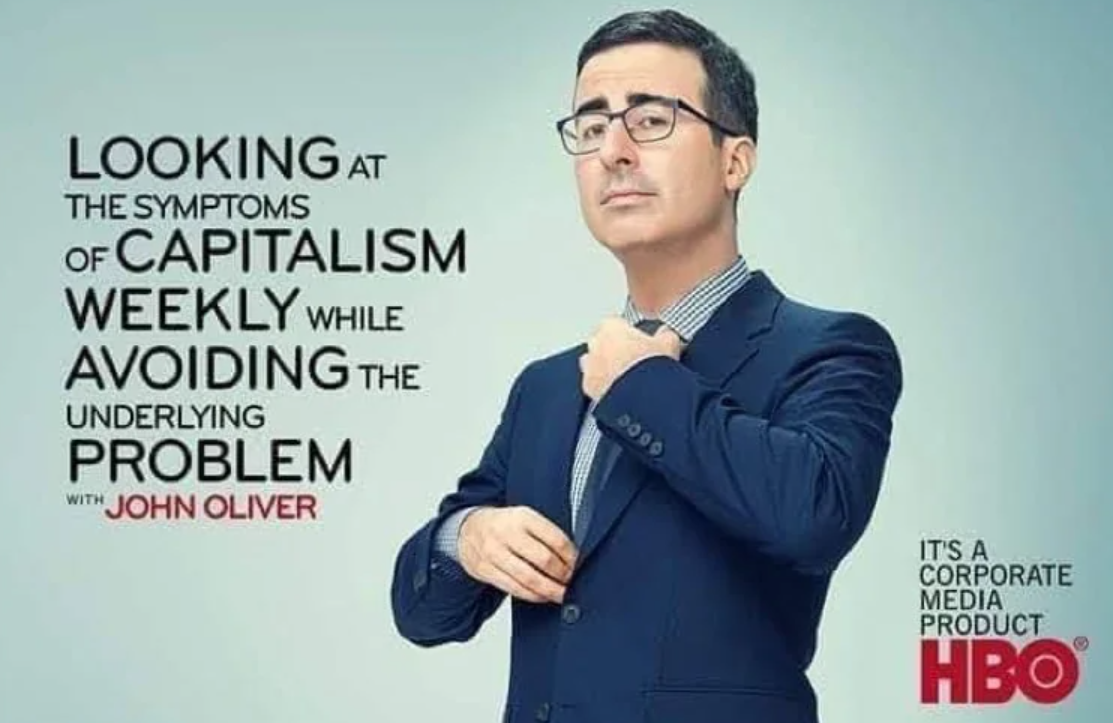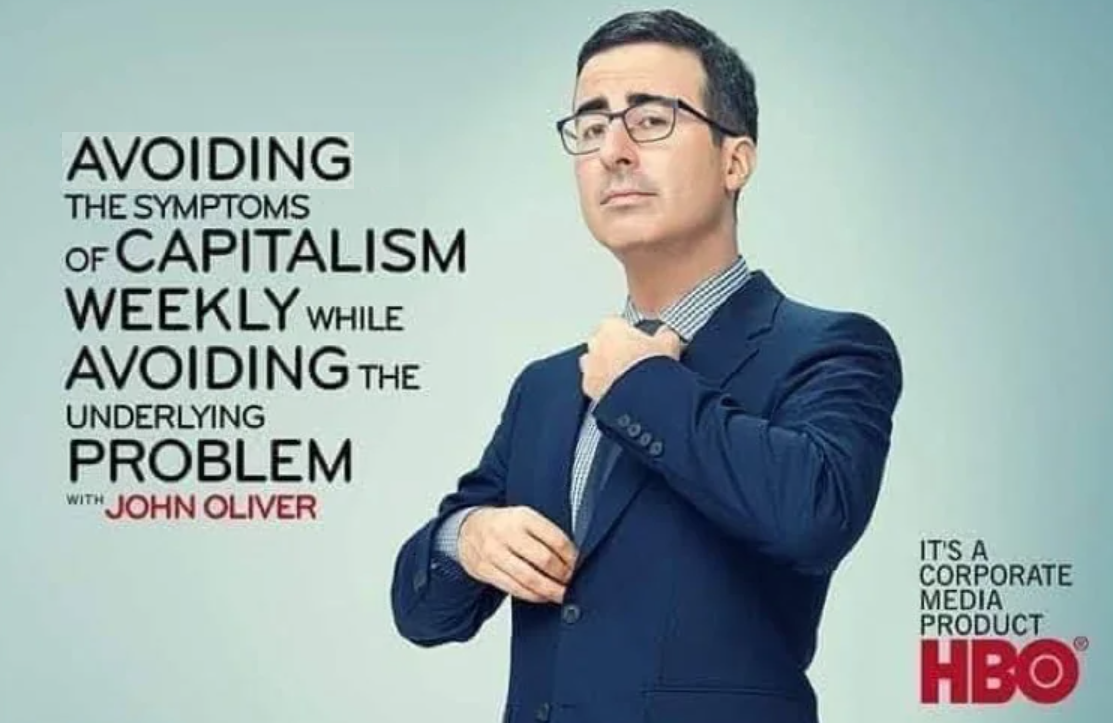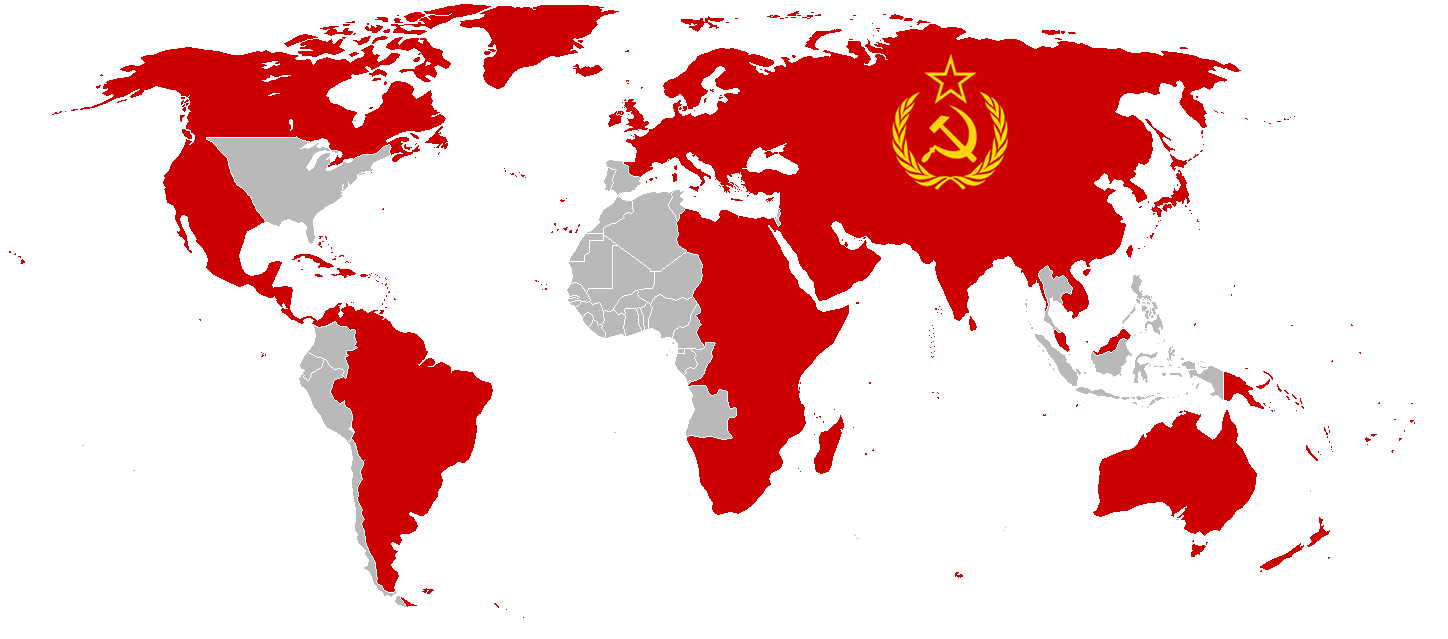“admiring the problem”

It’s crony capitalism!
It’s conservative capitalism!
It’s corporate capitalism!
It’s neoliberal capitalism!
It’s anything but capitalism as such.

Ha ha! They do make a pretense at being concerned though! It’s all to give liberals a reason to feel smug and superiorl
Oh man. In the not too distant past. About a year and a half now. I would say that, Yeah, that was one of my favorite shows and… Its very true. Watching that show give me a sense of superiority for sure.
In fact, it’s kind of funny. I think that show had a backlash effect on me. I’d watch this show every week expose some problem and then society would do fuck all to fix it. Long story short, I eventually realized that the problem was capitalism, obviously. Went on a journey to learn how to actually solve these problems.
Now I’m a tankie.
Thanks Mr. Oliver!
This show pisses me off specifically because it 1) often glosses over some of the most egregious evidence that points specifically to active US propagandism on issues and 2) never offers any solutions, even when they are staring you in the face.
Even when the show is right and does good research, that last point gets me. I can’t watch most episodes anymore without getting mad at it, so I stopped watching.
Yeah that’s where I’m at now, on both accounts. I started a segment on YouTube a month or so ago and could not get more than a couple minutes in. Too frustrating.
Honestly, reminds me of catholicism vibes when I think about it. And to be clear, I mean whatever brand of catholicism I grew up with in the US, I can’t speak for every form of it across the world. But anyway, the reason I think of it is because of the mindset that can surround penance and confession and the like. Notably (to my knowledge/experience with it) confession is fundamentally centered around penance and forgiveness, rather than around solving the problem. That’s not to say a priest would never give advice if you asked, but the structure of it is like that. When I used to be catholic and would go, it was never like, “Okay, what are you going to do to act differently?” It was like, “For your penance, say five hail marys” or whatever.
There might be theologians who would disagree with me, but to me it’s this thing kind of like, “As long as I feel pain by taking note of your pain, I in some way make up for your suffering.” When the reality is that if someone is in a burning building, they don’t want you to cry and sob and wear a hair shirt and give up sweets for a month, they want you to get them out of that building ASAP before they die. They don’t care if you are depressed or ecstatic doing it, they just want the help.
And I mean, there are cases, like with Palestine, where helping put a spotlight on it is something, however small it can seem. But Palestinian people don’t need you to spread the word because they need you to secondhand suffer for them. They need you to spread the word in order to resist imperialist narratives and stay alive more effectively. Among other reasons like building pressure for boycotting and so on.
Anywho, this is my scattered attempt at unraveling where some of this comes from.
“When I give food to the poor, they call me a saint. When I ask why they are poor, they call me a communist.” - Helder Camara
Notably (to my knowledge/experience with it) confession is fundamentally centered around penance and forgiveness, rather than around solving the problem. That’s not to say a priest would never give advice if you asked, but the structure of it is like that. When I used to be catholic and would go, it was never like, “Okay, what are you going to do to act differently?” It was like, “For your penance, say five hail marys” or whatever.
“God is dead, for we have killed him.”
This is exactly what Nietzche was referring to. Because religion shifts responsibility onto itself, religious followers don’t actually address their problems. Nietzche was being literal and metaphorical. Literal as is “the death of Christ at the hands of mortals” and metaphorical in the way you describe.
Nietzche thought this is why religious people often become nihilistic in both thoughts and actions. Because they are no longer to blame for others’ suffering, the religious person (Christians in particular) adopts a worldview that nothing in life matters because it’s all just preparation for the afterlife. It becomes easy for them to witness suffering and take no action because of it.
This has bled over into secular thinking, as well. Even when non-believers and apostates don’t have beliefs in religion, their ways of thinking have remained the same. This is especially rampant among capitalists who think the system is perfect. The system takes away blame and shifts it onto the disenfranchised (“Choose to be homeless,” bootstraps, welfare queens, and so on).
I think you might be on to something here.
You’re not the first to make the connection
And as this essay points out, it applies just as well to the western “left” as to “progressive” liberals
Great read, bookmarking this for future reference.
I think this is an excellent and accurate analysis, I have similar thoughts.









